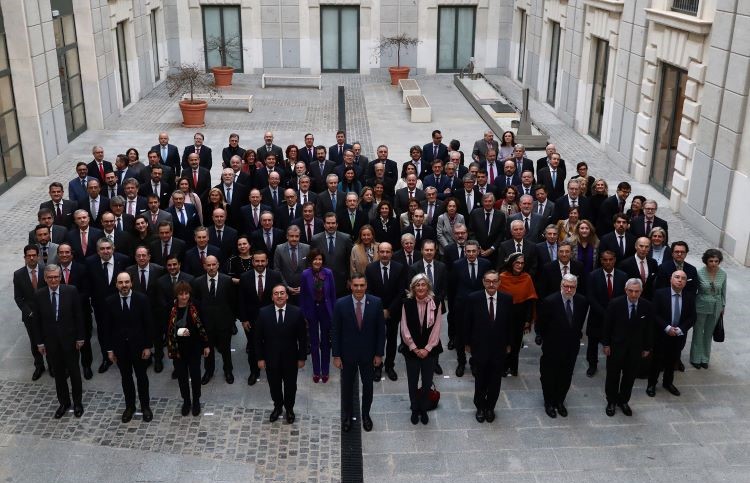The Diplomat
The President of the Government, Pedro Sánchez, and the Minister of Foreign Affairs, José Manuel Albares, yesterday presented the main thematic and regional priorities of Spanish foreign policy to the nearly 130 Spanish ambassadors around the world, whom they urged to “redouble their efforts” before the upcoming Presidency of the EU “to make it a great success for the country”.
“You are the image and emblem of an extraordinary country called Spain”, said Sánchez during the opening of the VII Conference of Ambassadors, the first fully face-to-face since 2008, which has been held since yesterday at the headquarters of the Ministry of Foreign Affairs in the Plaza del Marqués de Salamanca and will be closed today by the King. The meeting brings together the 118 ambassadors and 11 permanent representatives in international organizations that Spain has in the world.
During his speech, Pedro Sánchez announced that “multilateralism, solidarity and feminism” will be the three priority axes that will define Spanish foreign policy in 2023, while the five regional priorities for action of Spanish foreign policy will be “Europeanism, Atlanticism, ties with Latin America, strengthening relations with Asia and stability in North Africa”.
With regard to these five regional priorities, Pedro Sánchez highlighted Spain’s commitment to Europeanism and affirmed that “the Europhobic currents that have caused so much damage to countries around us have not made a dent in our country”, especially at a time when “it has once again been demonstrated that Europe needs to act united to face challenges such as a pandemic or a war, now on Europe’s doorstep”.
Spanish Presidency of the EU
Sánchez also expressed his hope that the Spanish Presidency of the Council of the EU, which will take place in the second half of 2023, will allow progress to be made on the major challenges that Europe will face in 2023, such as the development of strategic autonomy, the reform of economic governance, the reform of the electricity market and the completion of the European Union’s climate package to reduce greenhouse gas emissions by 55%. “I have to tell you that much is expected of our Presidency,” he said. It is the “greatest challenge we are going to face this year in our foreign policy” and the Government is counting, “consequently, on the sure redoubled effort of all of you, men and women, to make it a great success for the country”, he added.
In this regard, José Manuel Albares later assured the ambassadors that the reform of economic governance, the adoption by qualified majority of decisions on foreign policy or defense or the strengthening of strategic autonomy will be some of the priorities of the Spanish Presidency. “Europe is waiting for Spain’s leadership to protect Europeans and to protect our model, that of a social, supportive Europe committed to the welfare of Europeans,” he said. “It is waiting for us to be the driving force of this Europe,” he warned.
Regarding the Atlantist dimension of foreign policy, Sánchez highlighted “Spain’s commitment to Euro-Atlantic security”, which “has been shown by the success of the Madrid Summit last June”, at a time when “Putin’s war in Ukraine has highlighted the importance and validity of NATO” as a “force for peace and deterrence against autocracies” that “violate” the respect “for territorial integrity and freedom of peoples”.
Pedro Sánchez also stressed the importance of the ties between Spain and Latin America and the relevance of the European Union-Latin America summit, which has not met since 2015 and will be held during the Spanish Presidency. In this regard, Albares announced during his subsequent speech that this summit will be held in Brussels during the month of July and expressed his wish that it will contribute to the EU “never again” turning its back on Ibero-America. He also stated that the bi-regional summit will begin to be prepared during the Ibero-American Summit, which will take place in March in the Dominican Republic.
Likewise, Pedro Sánchez expressed his support to the President of Brazil, Luiz Inácio Lula da Silva, “and to the institutions freely and democratically elected by the Brazilian people” after the assault on Congress, the Presidential Palace and the headquarters of the Federal Supreme Court of Brazil by hundreds of supporters of former President Jair Bolsonaro, an event that, he said, shows that “the greatest threat to democracy, peace and prosperity in the world” is the “resurgence of ultras movements ready to overwhelm with all methods”.
China
Regarding Asia, the President of the Government highlighted the importance of China in foreign policy. “Spain must boost its relations with China, always within the framework agreed in the European Union, maintaining without a doubt a constructive dialogue on key issues, such as the climate emergency or the role it plays in other conflicts or crises,” he said. “We want, consequently, the international order based on rules to be the basis for facing both global challenges, where China obviously has a transcendental role to play, and also in our bilateral agenda, and I recently conveyed this to President Xi Jinping at the G20 summit in Bali,” he added. At that meeting, Sanchez asked Xi that “China use its influence to persuade Russia to end the war.”
The Spanish government last week tightened health control measures for air passengers from China because of the “significant deterioration of the epidemiological situation regarding COVID-19 in the People’s Republic of China”. The Beijing Government has described as “disproportionate and unacceptable” the travel restrictions imposed by many countries, which are “politically motivated” and will receive a “response based on the principle of reciprocity”.
The President of the Government also addressed Spain’s relations with North Africa and defended the need to support “the promotion of African solutions to the continent’s problems”. He also reiterated “Spain’s support for the entry of the African Union as a full member of the G20”.







